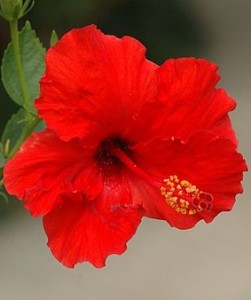
More evidence that low-calorie sweeteners are bad for your health
Studies show that artificial sweeteners can raise the risk of hypertension, metabolic syndrome, type 2 diabetes and heart disease, including stroke.

The beautiful hibiscus plant, with its brightly coloured trumpet shaped flowers, brings to mind hot summer days in exotic places.
Let your imagination free on a tropical holiday and eventually you’ll find yourself walking around with a hibiscus flower tucked behind your ear looking like you’ve just stepped out of a Gauguin painting.
But the beautiful hibiscus is also a medicinal treasure trove.
Hibiscus Sabdariffa L. (common name Roselle ) is a member of the Malvaceae, or mallow, family. It originated in Egypt and can now be found growing in warm places around the world including India, Africa, Sudan, Jamaica, China, Philippines, and the United States.
All the parts of Hibiscus Sabdariffa L. are used it is traditionally known to be a laxative, diuretic, anti-bacterial, and because of its high vitamin C content, antiscorbutic (protects against scurvy) and a good choice when you have a cold or flu.
Hibiscus tea (also known as sour tea) is tart tasting and rich in antioxidants, can protect the liver. stimulate the appetite and help reduces fevers and soothe coughs and soothe and help repair the skin.
The flowers are also used in the production of food, such as yogurts, ice-creams and syrups.
The seeds are used in the production of vegetable oil in China, and can be dried and ground as a coffee substitute. Hibiscus root is edible and used as an aperitif and tonic in the Philippines. The fibrous part of the plant stem used in the production of twine and cord known as ‘rosella hemp’.
Antioxidant benefits
Scientific interest in the hibiscus plant has grown recently, particularly with regard to its use in treating the signs and symptoms of metabolic syndrome.
It has been hypothesized that the antioxidant and anti-inflammatory polyphenols present in hibiscus are of benefit in helping to prevent and treat this condition.
Hibiscus is particularly rich in highly active flavonoids such as gossypetin, sabdaretine, hibiscetine and anthocyanins.
In 2004 an animal study found that hibiscus flower had the same health benefits as red wine and tea.
That same year a human study confirmed that hibiscus is effective at lowering blood pressure in people suffering from hypertension. Further studies have shown that hibiscus acts like an ACE inhibitor to lower blood pressure.
Other studies have suggested that the antioxidants in hibiscus may have anti-cancer effects. In one study human gastric carcinoma (AGS) cells proved highly susceptible to hibiscus extract. Laboratory studies show antioxidant-rich hibiscus can promote leukaemia cell death as well.
Hypertension and cholesterol
Another study in 2008 found that drinking hibiscus tea can significantly reduce high blood pressure in people with type 2 diabetes. The study results showed the average systolic blood pressure for those drinking hibiscus tea decreased from 134.8 mmHg at the beginning of the study to 112.7 mmHg at the end of the study, one month later.
Though not all studies have shown a positive benefit in lowering cholesterol, many have. For instance, in 2007, a small clinical trial found that Hibiscus (6 capsules of 500mg hibiscus extract, for a total of 3000 mg each day) reduced cholesterol by up to 14.4% after just one month. In this study a lower total daily amount (1500 mg) and a higher total daily amount (4500 mg) were not as effective as the moderate dose.
In another study of 53 diabetics, mostly women, participants were given either hibiscus tea or black tea (2 cups a day for 1 month). In the group consuming hibiscus tea, there was an average 7.6% decrease in total cholesterol, an 8.0% decrease in LDL (‘unhealthy’) cholesterol, a 14.9% decrease in triglycerides and a and a 16.7% increase in HDL (‘healthy’) cholesterol.
A large study of 222 patients – some with and some without metabolic syndrome – found that a daily dose of 100 mg H. sabdariffa extract powder taken for one month reduced glucose, total cholesterol and LDL cholesterol and increased HDL cholesterol.
Animal studies have suggested that hibiscus can blood glucose relative to control, and to a similar degree as the pharmaceutical drug glibenclamide.
Safe and gentle
Hibiscus is a safe remedy to take with no proven adverse reactions or drug interactions.
There is no standardised dose but for addressing cholesterol issues try taking the equivalent of 1,000 mg dried herb 3 times a day; 1 cup of tea twice a day, or 100 mg of standardized extract twice a day. For hypertension try 1 cup of tea twice a day or dried powdered hibiscus extract providing 250 mg anthocyanins, per day.

Please subscribe me to your newsletter mailing list. I have read the
privacy statement